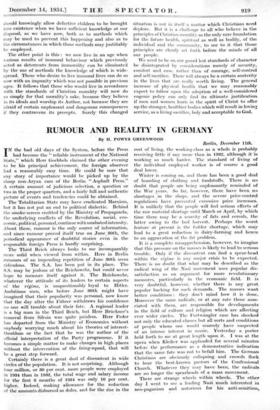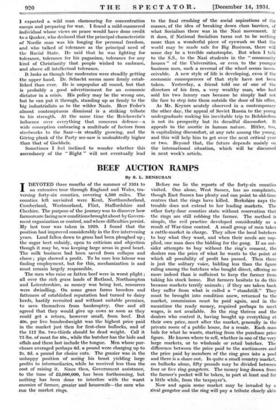RUMOUR AND REALITY IN GERMANY
By H. POWYS GREENWOOD
Ithe bad old days of the System, before the Press 1 had become the " reliable instrument of the National State," which Herr Goebbels claimed the other evening to be his principal achievement, the foreign observer had a reasonably easy time. He could be sure that any story of importance would be picked up by the sharp non-Aryan ears of the Berlin " Asphalt Press." A certain amount of judicious selection, a question or two in the proper quarters, and a fairly full and authentic picture of events and tendencies could be obtained.
The 'Totalitarian State may have eradicated Marxism, but it has not put an end to political dialectic. Behind the smoke=screen emitted by the Ministry of Propaganda, the underlying conflicts of the Revolution, social, eco- nomic, political, personal, continue with unabated intensity. About these, rumour is the only source of information, and since rumour proved itself true on June 80th, the periodical appearance of doubtful stories even in the responsible foreign Press is hardly surprising.
The Third Reich always looks to me incomparably more solid when viewed from within. Here in Berlin rumours of an impending repetition of June 30th seem ridiculous. The S.A. has been put in its place. The S.S. may be jealous of the Reichswehr, but could never hope to measure itself against it. The Reichswehr, whatever the attitude of its leaders to certain aspects of the re,gime, is unquestionably loyal to Hitler. Ambitious men, who before June 30th might have imagined that their popularity was personal, now know that the day after the Fiihrer withdraws his confidence no one will trouble about their fate. A regional leader is a big man in the Third Reich, but Herr Briicluier's removal from Silesia was quite painless. Herr Feder has departed from the Ministry of Economics without anybody worrying much about his theories of interest- thraldom or the fact that he was the author of the official interpretation of the Party programme. If it becomes a simple matter to make changes in high places without the intervention of the firing-squad, that will be a great step forward. Certainly there is a great deal of discontent in wide circles of the population. It is not surprising. Although four million, or 80 per cent. more people were employed in 1934 than in 1932, the total wage and salary income for the first 6 months of 1934 was only 10 per cent. higher. Indeed, making allowance for the reduction of the amounts disbursed as doles, and for the rise in the Berlin, December 11th. cost Of living, the working-class as a whole is probably receiving little if any more than in 1982, although it Is working so much harder. The standard of living of the individual employed worker is of course a good deal lower.
Winter is coming on, and there has been a good deal of hoarding of clothing and foodstuffs. There is no doubt that people are being unpleasantly reminded of the War years. So far, however, there have been no shortages .in the shops, and the severe price-control regulations have prevented excessive price increases. It is unlikely that the people will feel serious effects of the raw material shortage until March or April, by which time there may be a scarcity of fats and cereals, the latter owing to the bad harvest. Perhaps the worst feature at present is the fodder shortage, which may lead to a great reduction in dairy-farming and hence to an aggravation of the fat problem.
It is a complete misapprehension, however, to imagine that this pressure on the masses is likely to lead to serious trouble. Only if the discontent can find a spear-head within the regime is any major crisis to be expected. There is no doubt that what may be described as the radical wing of the Nazi movement uses popular dis- satisfaction as an argument for more revolutionary measures, particularly in the economic field. It is very doubtful, however, whether there is any great popular backing for such demands. The masses want better conditions : they don't !Rind how it is done. Moreover the same radicals, or at any rate those asso- ciated with them, are responsible for developtnents in the field of culture and religion which are affecting ever wider circles. The Furtwangler case has shocked not only the educated classes but all sorts and conditions of people whom one would scarcely have suspected of an intense interest in music. Yesterday a porter held forth to me at great length upon it. I was at the opera when Kleibn was applauded for several minutes before the performance as a demonstrative indication that the same fate was not to befall him. The German Christians are obviously collapsing and crowds flock to hear the best-known pastors of the Confessional Church. Whatever they may have been, the radicals are no longer the spearheads of a mass movement. .
There are strange wheels within wheels. The other day I went to see a leading Nazi much interested in neo-paganism and notorious for his anti-semitism. I expected a wild man clamouring for concentration camps and preparing for war. I found a mild-mannered individual whose views on peace would have done credit to a Quaker, who declared that the principal characteristic of Nordic man was his longing for personal freedom, and who talked of tolerance as the principal need of the Racial State. He said that he was fighting for tolerance, tolerance for his paganism,- tolerance for any kind of Christianity that people wished to embrace, and above all intellectual tolerance.
It looks as though the moderates were steadily getting the upper hand. Dr. Schacht seems more firmly estab- lished than ever. He is unpopular all round; but that is probably a good advertisement for an economic dictator in a crisis. His policy may be the wrong one, but he can put it through, standing up as firmly to the big industrialists as to the wilder Nazis. Herr Feder's almost contemptuous dismissal is a striking tribute to his strength. At the same time the Reichswehr's influence over everything that concerns defence—a wide conception embracing a multitude of factors from steelworks to the Saar—is steadily growing, and the Goring plank of the Party see-saw is undoubtedly higher than that of Goebbels.
Sometimes I feel inclined to wonder whether this ascendancy of the " Right " will not eventually lead to the final crashing of the social aspirations of the masses, of the idea of breaking down class barriers, of :what. Socialism -there was in the Nazi movement. If it does, if National Socialism turns out to be nothing more than a wonderful piece of eyewash so that the world may be made safe for Big Business, there will some day be a terrible catastrophe. But when I talk to the S.S., to the Nazi students in the " community houses " of the Universities, or even, to the younger -business men; such a reversal of the wheel seems incon- ceivable: A new style of life is developing, even if the .economic consequences of .that. style have not been :taken. Yesterday, a friend told me - of one of the directors of his firm, a very wealthy man, who had sold his two luxury cars because he simply had not the face to step into them outside the door of his office.
As Mr. Keynes acutely observed in a contemporary the other day,..the appeal of Soviet Russia to the young undergraduate making his inevitable trip, to Bolshiedom is not its prosperity but its dreadful discomfort. It appeals to the ascetic in human nature. Hitler, too, is capitalizing discomfort, at any rate among the young, and this will help him to get over the next critical year or two. Beyond that, the future depends mainly on the international - .situation, -which will be • discussed in next week's article.








































 Previous page
Previous page